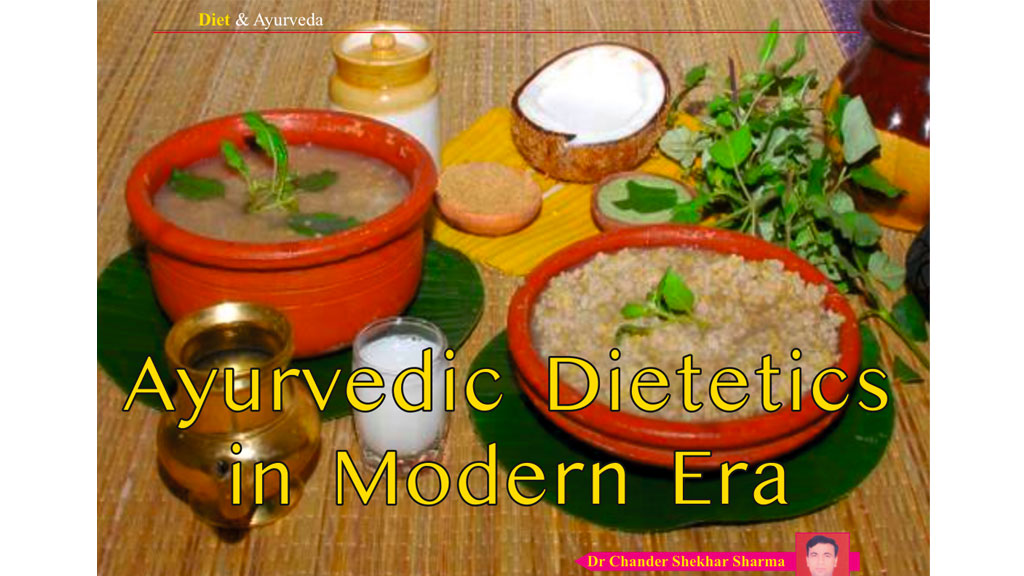In Ayurveda, many holistic and scientific approaches have been described about planning of the diet. The fundamental principles like tridosha, prakriti, the tastes, processing of food, quality, quantity and the rules regarding eating food if considered while incorporating the diet, one can be kept away from many diseases of body and mind.
In Ayurveda, many holistic and scientific approaches have been described about planning of the diet. The fundamental principles like tridosha, prakriti, the tastes, processing of food, quality, quantity and the rules regarding eating food if considered while incorporating the diet, one can be kept away from many diseases of body and mind. Human body requires food to provide energy for all life process, growth, repair and maintenance. A balanced diet contains different types of foods in such quantities and proportions that the need of the body is adequately met. Eating a well-balanced diet on a regular basis and staying at ideal weight are critical factors in maintaining emotional and physical wellbeing. In Ayurveda, diet is included in the Tri-Upastambha (three pillars of life) i.e Aahar , Nidra and Brahmcharya. Being supported by these three factors, the body is endowed with strength, complexion and growth and continues up till the full span of life, provided a person does not indulge in such regimen as are detrimental to health . According to Ayurveda any material in the universe, is composed of five basic elements, the Pancha Mahabhootas, namely Prithvi, Jal, Agni, Vayu and Akasha. The Tridoshas (Biological Humors) i.e. Vata, Pitta and Kapha which constitute the body are also Panchbhautik. Each food article has dosha aggravating, pacifying or balancing action on human body. To keep the homoeostasis of Doshas (health), Ayurveda has described specific diet. Proper planning of the diet can maintain the homoeostasis of body.
Diet plays an important role in keeping our body and mind healthy. Considering the effect of food on mind, the diet has been classified into:
Satvik diet contains vegetarian, non-oily, non-spicy food which are congenial to the body.
Rajasik diet includes food items that are very spicy, hot, sour and salty.
Tamasik diet is too oily, heavy food that leads to reduced efficiency of mind.
By following a good routine, if we eat foods uniquely suited to our physiology and that enhance digestion, we will feel happier and healthier at any age. Various processed foods and foods to which artificial preservatives or other synthetic chemicals have been added are no longer alive with the intelligence of nature.
 “YATHA PINDE TATHA BRAHMANDE” Our human physiology is a reflection of the laws of the universe and our lives are more in tune with nature. Body possesses the natural intelligence to process the foods that are closest to nature such as fresh whole grains and organically grown fruits and vegetables. Eat loads of fruits and vegetables not only for their nutritional value but also because they are good natural internal cleansers. In Ayurvedic texts, it has been mentioned with great emphasis that each meal should contain all six Rasas i.e sweet (madhur), sour (amla), salty (lavan), bitter (tikta), astringent (kshaya) and pungent (katu). Mandagni (reduced digestive fire) is responsible for sarva roga (all kinds of diseases). Ayurveda describes agni as a vital component which helps in digestion of food and is responsible for metabolic activities. Agni transforms food into nutritional energy which is responsible for physiological functioning of body. Agni not only performs functioning of digestion but also contributes to the strength and luster etc. The root cause of most disorders is building-up of ama i.e digestive toxins resulting from improper digestion. Undergo cleansing during every change of seasons to detox and rid the body of ama, is recommended for optimal health. Drinking lots of warm water throughout the day helps to rehydrate our system and flush toxins out of the body. Avoid drinking ice-cold water, especially before, during and after meals.
“YATHA PINDE TATHA BRAHMANDE” Our human physiology is a reflection of the laws of the universe and our lives are more in tune with nature. Body possesses the natural intelligence to process the foods that are closest to nature such as fresh whole grains and organically grown fruits and vegetables. Eat loads of fruits and vegetables not only for their nutritional value but also because they are good natural internal cleansers. In Ayurvedic texts, it has been mentioned with great emphasis that each meal should contain all six Rasas i.e sweet (madhur), sour (amla), salty (lavan), bitter (tikta), astringent (kshaya) and pungent (katu). Mandagni (reduced digestive fire) is responsible for sarva roga (all kinds of diseases). Ayurveda describes agni as a vital component which helps in digestion of food and is responsible for metabolic activities. Agni transforms food into nutritional energy which is responsible for physiological functioning of body. Agni not only performs functioning of digestion but also contributes to the strength and luster etc. The root cause of most disorders is building-up of ama i.e digestive toxins resulting from improper digestion. Undergo cleansing during every change of seasons to detox and rid the body of ama, is recommended for optimal health. Drinking lots of warm water throughout the day helps to rehydrate our system and flush toxins out of the body. Avoid drinking ice-cold water, especially before, during and after meals.
Human body requires food to provide energy for all life process, growth, repair and maintenance. A balanced diet contains different types of foods in such quantities and proportions that the need of the body is adequately met. Eating a well-balanced diet on a regular basis and staying at ideal weight are critical factors in maintaining emotional and physical well-being.
Let’s pursue what is in our control. Living a balanced lifestyle, getting adequate rest, staying hydrated so our bodies can rid themselves of impurities. Getting some form of reasonable exercise and eating pure foods are all in our control and are something we can do to help stay healthy. Our busy lifestyles can lead us to eat on the go, eat while working, skip meals or eat "junk" foods. However, Ayurveda holds the belief that we can add life to our years and years to our life by following a good eating routine. The food we eat can nourish our mind, body and emotions, not just our body. Cooking and eating in a harmonious atmosphere turns food into nectar.
Dr. Chander Shekhar Sharma
Professor, Dayanand Ayurvedic College,
Mahatma Hans Raj Marg, Jalandhar-8 (Pb.)
Mob.: 98051-85799







 Dec 2024
Dec 2024
 May 2024
May 2024
 September 2022
September 2022
 April 2022
April 2022
 October 2020
October 2020
 Jan 2020
Jan 2020
 June 2019
June 2019
 January-February 2019
January-February 2019
 Augest-September
Augest-September
 April 2018
April 2018
 November 2017
November 2017
 June 2017
June 2017
 November 2016
November 2016
 September 2015
September 2015
 March 2015
March 2015
 July 2014
July 2014
 January 2014
January 2014
 July2013
July2013
 March 2013
March 2013
 May 2012
May 2012
 May 2011
May 2011
 Sep 2010
Sep 2010
 Jun 2010
Jun 2010
 Feb 2010
Feb 2010
 December 2009
December 2009
 August 2009
August 2009
 June 2009
June 2009
 Feb 2009
Feb 2009
 December 2008
December 2008
 October 2008
October 2008
 March 2008
March 2008
 July 2008
July 2008
 May 2008
May 2008